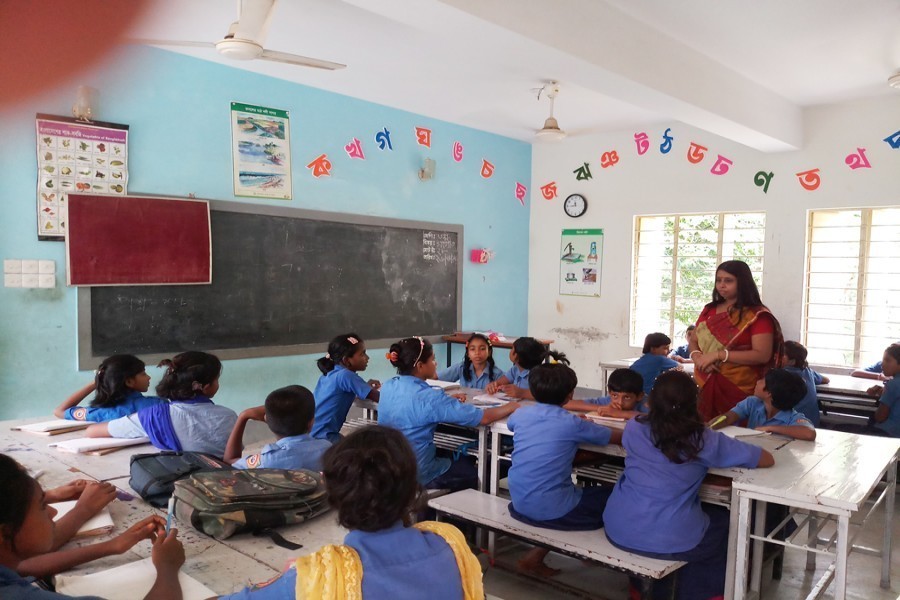
Published :
Updated :

A statement made by UNICEF Executive Director Henrietta Fore and UNESCO Director-General Audrey Azoulay on July 9 last for reopening schools has come as no surprise. The heads of the two UN sister organisations working for children's rights and education are insistent that opening 'schools for in-person learning cannot wait'. They elaborate, "It cannot wait for cases to go to zero. There's clear evidence that primary and secondary schools are not among the main drivers of transmission". The two leaders then add that Covid-19 transmission in schools can be managed with 'appropriate mitigation strategies in most settings'. They emphasise "schools should be the last to close and the first to reopen".
The urgency as expressed by their statement is clear and they have particularly pleaded with the governments of 19 nations where schools have remained closed for 15 months, adversely affecting 156 million students. Bangladesh is obviously one of the countries where schools are shuttered till now and no one can tell when they will reopen. Currently, though, the closure remains effective till July 31.
In response to the UNICEF and UNESCO chiefs' call, Bangladesh has expressed its desire to open schools and colleges after inoculating teachers and students within the shortest possible time. Health Minister Zahid Maleque claims that the national technical committee on Covid-19 and the vaccination committee are working on it. Although it is claimed that 65 per cent of teachers have received the jab, no deadline has been set for bringing the rest under vaccination cover. Nor is there any clear outline for vaccinating school and college students. Residential students of public universities have only been prioritised for vaccine registration. Surely, it will take time to cover all students of public varsities. Then there are private universities to cover.
If vaccine coverage of university students is not guaranteed soon, how can one assure that school and college students who comprise more than two-thirds of the 40 million students will be vaccinated within a short time? The proposition is untenable. After all, availability of vaccine is a crucial factor in this regard. Already the possibility of promotion without in-person examination for school and college students looms large. Some private schools in the capital have been conducting examinations along with classes and assignments online. They can do so because in an urban setting such as the capital's, facilities are present. Although the process is a poor substitute, it somehow retains students in the learning process.
It is exactly against this background the comment made by Henrietta Fore and Audrey Azouley reinforces the view that the authorities including those in Bangladesh have failed to prioritise education. They remark, "governments have too often shut down schools and kept them closed for long periods, even when the epidemiological situation didn't warrant it". Like other countries, Bangladesh also took such actions as a first recourse rather than a last measure. They question the sagacity of closing schools while allowing shopping malls, restaurants etc. to operate. In Bangladesh, even public transports were in operation without maintaining health protocols although the authorities warned against such violation but taking no action whatsoever.
Right now, the relaxation of the lockdown before the Eid-ul Azha against the advice of the national technical committee on Covid-19 may lead to several events of super spreader of the Delta variant of the pathogen. Bangladesh is now first and fourth in the world in terms of the rate of infection. If the situation worsens further in the weeks following the mass movement of people during the festival, the possibility of reopening not only schools but also universities may look bleak.
However there was a time when villages were almost completely free from coronavirus attack. Suggestions made earlier for opening schools in areas where the virus was absent went unheeded. The argument that there is no point in getting adamant to open school at the same time was dismissed. Why? Village students are long discriminated against because of lack of facilities and poor quality teaching staff. If schools were open there, at least these neglected students would not have regressed and in some cases could have narrowed the gap with their counterparts in cities and towns.
The UNICEF and UNESCO could argue with governments such as the likes of Bangladesh for opening schools much earlier when for months the greater parts of Bangladesh were free from the disease. Even today, when villagers are the majority casualty both in terms of death and infection, there are areas that do not report infection, least of death. Schools can be opened there with no threat of spread of the virus if health precautions are in place. Waiting for inoculation of all the teachers and students may delay reopening schools in the country by not only months but by years. This is unacceptable.
More than 75 per cent village students are deprived of online facilities, electronic devices and even their teachers are not accustomed to the technology involved and methods used for remote teaching. In-person teaching and learning in virus-free rural areas is not a big challenge. If their learning process is not taken care of urgently, these laggards will not only regress but also drop out in great numbers. Arrangement of in-person classes in the open and under trees or even scheduled for alternate days can overcome some limitations. Moreover, bachelor and master degree holders looking for jobs may be recruited under a crash programme for educating such school students.


 For all latest news, follow The Financial Express Google News channel.
For all latest news, follow The Financial Express Google News channel.